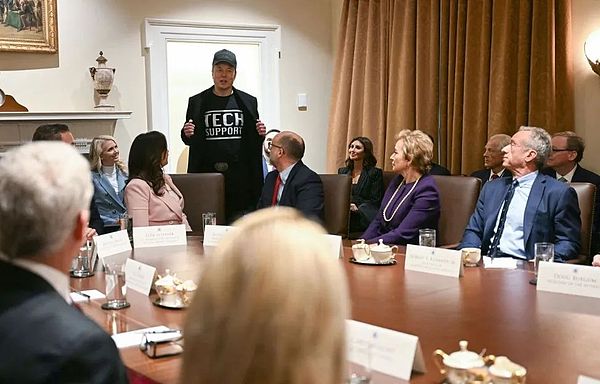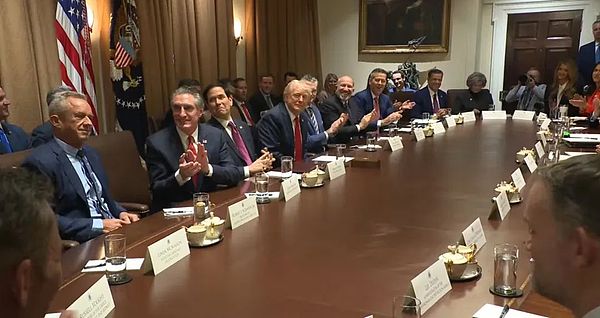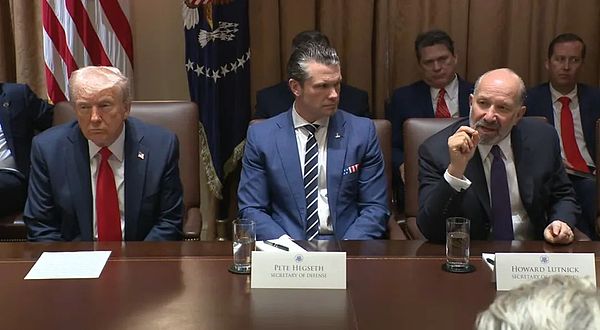Source: Cailian Press
On Wednesday local time, the Trump administration held its first cabinet meeting of the new term. The entire "Trump team" appeared in front of the media at the same time and accepted various inquiries for nearly an hour. Musk, the world's richest man and head of the "Government Efficiency Department", attended the meeting.
At the same time, due to the Trump administration's erratic and changing orders every day, this is also an important opportunity for the outside world to figure out what they are going to do.
The following is a summary of some of the meeting content, covering a series of hot topics such as the Ukrainian ceasefire, tariff measures, and "golden visas".
Ukraine issue
At the beginning of the meeting on Wednesday, Trump announced that Ukrainian President Zelensky would visit the White House on Friday to sign a "major agreement" on Ukraine's natural resources and post-war reconstruction.
He said: "We have reached an agreement that we will get our money back and get more money in the future, and I think this is appropriate."
It is worth mentioning that Trump quoted data from nowhere in his speech, claiming that the United States gave Ukraine $350 billion, which is three times that of Europe. But according to the Kiel Institute for the World Economy, the total amount of US grants is $119 billion, while Europe has reached $138 billion.
Even if he takes Ukraine's mines and money, Trump made it clear that he would not give Ukraine security guarantees "beyond a very limited scope" and that Ukrainians could "forget" about joining NATO.
Trump said: "We will let Europe do it (provide security guarantees) because Europe is their neighbor. We will have real cooperation with Ukraine on rare earths. We need rare earths very much and they have very good rare earths."
It should be noted that there is currently insufficient evidence to support the claim that "Ukraine has a lot of good rare earths."
Musk was listening in the corner
Although he is not a member of the cabinet, Musk, the world's richest man, attended the meeting as a member of the "Government Efficiency Department" and sat low-key in the corner of the conference room with the assistants of cabinet officials.
However, Trump specifically asked Musk to "stand up and say a few words."
Musk wore his iconic "Technical Support" T-shirt and told the officials that he was just a "technical support staff" and that one of the jobs of the "Government Efficiency Department" was to repair the U.S. government's dilapidated computer systems and solve the huge government deficit and debt problems.

The world's richest man mentioned that he received "a lot of death threats" because of this job.
Then Trump followed up on the reporter's question and asked all the officials present on the spot: "Are there any of you who are dissatisfied with Musk?"
The US President looked around and said: "If anyone is dissatisfied, we will throw this person out."

The US government ministers sitting around the conference table laughed to varying degrees and began to applaud.
Trump continued: "They have great respect for Musk and what he is doing. Some have slightly different opinions, but I tell you, most people are not only happy, but even excited."
Musk also explained the requirement for US federal employees to write work summaries. He emphasized that this is a "pulse test" to detect whether those people are alive and have the ability to read emails and reply.
Selling "golden visas" to repay debts
Trump also gave further explanations on the "golden visa" proposed on Tuesday. He said yesterday that he would adjust the investment immigration policy and the US government would issue "golden cards", that is, permanent residency, to those who are willing to pay $5 million.
The focus of Wednesday's speech was to settle accounts-the Trump administration seemed ready to repay US debts by "selling visas."
Commerce Secretary Lutnick said that selling just 200,000 "golden visas" would be equivalent to $1 trillion in revenue. Trump added that if 10 million could be sold, that would mean $50 trillion, which would not only pay off all U.S. debts, but also have a surplus of $15 trillion.
Trump also said that applicants for these visas would not be forced to create jobs, and there would most likely be no quota system for applicants based on their original nationality.
Tariffs
Trump also continued to wield the "tariff stick" on Wednesday. Regarding the "25% tariff on Canada and Mexico" that was postponed for 30 days at the beginning of the month, Trump initially said it would be implemented on April 2. This seemed to confirm that the two countries would get an additional 30-day extension next week.
But Lutnick quickly interjected that the two countries would have to prove to Trump the progress they had made on border control, and then the US president would decide whether to grant an extension. And the larger tariff shift will happen on April 2.

Trump also mentioned that the tariff rate on the EU will be 25% "in general", involving cars and all other things, and the specific details will be announced shortly.
 Miyuki
Miyuki
 Miyuki
Miyuki Brian
Brian Weiliang
Weiliang Miyuki
Miyuki Brian
Brian Weiliang
Weiliang Miyuki
Miyuki Brian
Brian Weiliang
Weiliang Miyuki
Miyuki